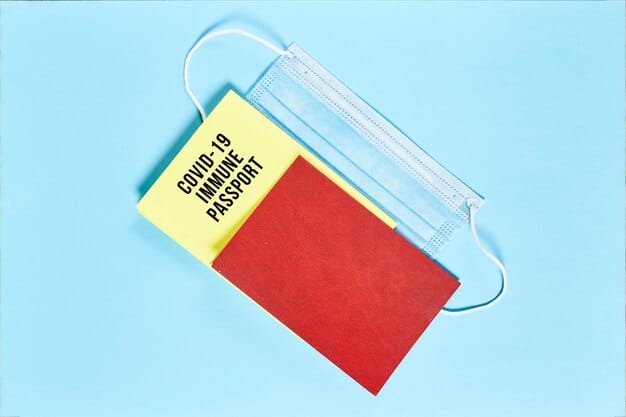Latest Health Requirements for US International Travel in 2025

US citizens planning international travel in 2025 should be aware of potential new health requirements, including vaccination updates, testing protocols, and insurance mandates, to ensure smooth and safe journeys.
Planning an international trip in 2025? It’s crucial to stay informed about the Latest Updates: New Health Requirements for US Citizens Traveling Internationally in 2025. Don’t let unexpected regulations disrupt your travel plans; read on to ensure a smooth and healthy journey.
Understanding the Evolving Landscape of International Travel Health
International travel is constantly evolving, and 2025 promises significant updates to health requirements for US citizens. These changes aim to enhance global health security and protect travelers from emerging health risks. Staying informed about these evolving requirements is essential for a worry-free trip.
Several factors contribute to the changing landscape of international travel health, including:
- Global health crises, such as pandemics and outbreaks of infectious diseases
- Advances in medical science and technology, leading to new vaccines and testing methods
- Increased awareness of the importance of preventative healthcare for travelers
These factors influence the decisions made by international health organizations and national governments regarding travel health requirements.

Key Areas of Focus for 2025 Health Requirements
When planning international travel in 2025, it’s crucial to understand the key areas of focus for new health requirements. These areas typically include vaccinations, testing, and health insurance, all designed to ensure your safety and the safety of others.
Let’s explore each of these areas in detail:
Vaccination Requirements
Many countries require proof of vaccination against specific diseases, such as yellow fever or measles, before allowing entry. The specific vaccinations required may vary depending on your destination and your personal medical history.
Testing Protocols
Some countries may require travelers to undergo testing for specific diseases, such as COVID-19 or tuberculosis, before or upon arrival. The type of test required, and the timing of the test, may vary depending on the country and the specific health risks it faces.
Health Insurance Mandates
Certain countries may require travelers to have health insurance that covers medical expenses incurred during their stay. This insurance should be valid in the destination country and provide adequate coverage for potential medical emergencies.
Staying informed about these three pillars of health requirements—vaccinations, testing, and health insurance—is paramount for planning your international travel in 2025.
Vaccination Updates and Recommendations
Staying up-to-date with vaccination updates and recommendations is paramount for safe international travel. Specific requirements may change, so monitoring official sources is crucial.
Vaccination recommendations for international travel usually depend on factors like destination, duration of trip, activities, and individual health conditions. The CDC and WHO offer invaluable resources:
- Yellow Fever Vaccination: Required by many countries in Africa and South America.
- Measles, Mumps, and Rubella (MMR): Ensuring you’re up-to-date protects yourself and reduces global spread.
- Polio: Some countries may require proof of vaccination due to ongoing outbreaks.
- COVID-19: Requirements can vary, but vaccination is generally recommended for international travel.
Always consult with your healthcare provider or a travel health specialist to review your immunization history and determine which vaccinations are recommended or required for your specific trip.
Navigating Testing Protocols for International Travel
As we move into 2025, testing protocols for international travel are likely to remain an important aspect of ensuring public health safety. Staying informed about the latest testing requirements is essential for travelers.
Here are some key areas to consider regarding testing protocols:
Types of Tests
Different countries may accept different types of tests, such as PCR tests, antigen tests, or rapid tests. Be sure to check which types of tests are accepted by your destination country.
Testing Timeframes
Many countries require travelers to take a test within a specific timeframe before departure or upon arrival. This timeframe can vary from 24 hours to 72 hours, so it’s essential to check the specific requirements of your destination country.
Proof of Testing
Travelers may be required to provide proof of a negative test result in the form of a physical document or a digital certificate. Make sure you have the necessary documentation before you travel.
Navigating these protocols effectively can significantly reduce stress and potential travel disruptions.

The Increasing Importance of Travel Health Insurance
Travel health insurance is becoming more critical than ever for international travelers. Medical emergencies can occur unexpectedly, and having adequate insurance coverage can protect you from significant financial burdens.
Here’s what to consider:
Coverage Details
Ensure your policy covers medical expenses, hospitalization, emergency evacuation, and repatriation.
Policy Validity
Confirm that the policy is valid in all countries you plan to visit and for the entire duration of your trip.
COVID-19 Coverage
Look for policies that specifically cover COVID-19-related expenses since this remains a significant concern.
Investing in comprehensive travel health insurance offers peace of mind, knowing you’re protected against unforeseen medical events.
Preparing for Your Trip: A Step-by-Step Guide
Preparing thoroughly for your international trip can significantly reduce stress and ensure a safe and enjoyable journey. From vaccinations to documentation, there are several key steps to follow.
Follow this detailed guide to ensure you cover all bases:
- Check your destination’s health requirements: Visit the CDC and WHO websites for the latest updates.
- Consult with a healthcare provider: Discuss any necessary vaccinations or health precautions at least 4-6 weeks before your trip.
- Organize necessary documentation: Keep copies of vaccination records, test results, and health insurance policies.
- Pack essential health supplies: Include a first-aid kit, necessary medications, and personal protective equipment.
- Register with your embassy: In case of emergencies, this ensures they can reach you.
By following these steps, you’ll be well-prepared to handle any health-related issues that may arise during your international travels.
| Key Point | Brief Description |
|---|---|
| 💉 Vaccination Updates | Stay updated on required and recommended vaccines for your destination. |
| 🧪 Testing Protocols | Understand testing requirements, accepted tests, and timeframes. |
| ⚕️ Health Insurance | Ensure your policy covers medical emergencies and COVID-19 related expenses. |
| 📝 Documentation | Organize all necessary health documents for smooth transit. |
Frequently Asked Questions
Commonly required vaccines include Yellow Fever, MMR (Measles, Mumps, Rubella), Polio, and, increasingly, COVID-19. Always check specific destination requirements.
It’s best to check health requirements at least 1-2 months before your trip. Some vaccinations require multiple doses over several weeks.
Comprehensive travel health insurance should cover medical expenses, emergency evacuation, and COVID-19-related costs. Verify policy validity in your destination.
Reliable sources include the CDC (Centers for Disease Control and Prevention) and the WHO (World Health Organization) websites, along with your healthcare provider.
Carry copies of your vaccination records, recent test results (if required), health insurance policy details, and any important medical prescriptions.
Conclusion
Staying informed about the latest health requirements is crucial for US citizens planning international travel in 2025. From vaccination updates and testing protocols to travel health insurance, preparation is key to ensuring a safe and enjoyable trip. Always consult official sources and healthcare professionals to make well-informed decisions.





